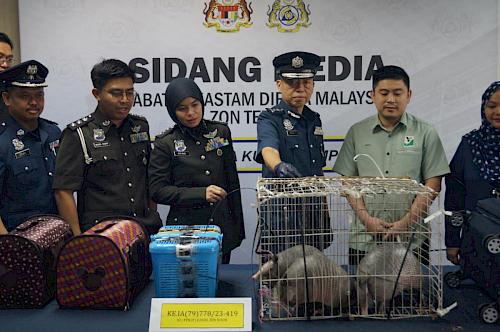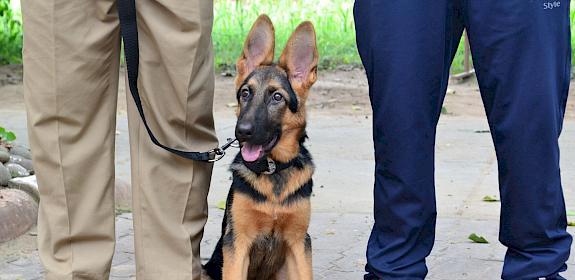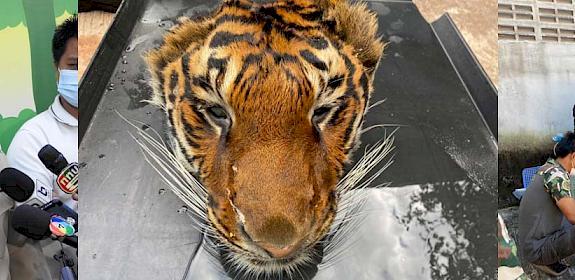Suitcase of armadillos shows no species spared in trafficking via Southeast Asia’s airports
Three live armadillos, native to the Americas, were discovered stuffed in a suitcase at a Malaysian airport, in a case that highlights the persistent use of Southeast Asia’s airports to traffic wildlife for the exotic pet trade.
The armadillos were detected on 28 October, just before the suspect transporting them was about to board a flight for Colombo, Sri Lanka. The armadillos have been identified as Nine-Banded Armadillos Dasypus novemcinctus.
The discovery unfolded during an x-ray of the bag at Malaysia’s bustling Kuala Lumpur International Airport Terminal 2, which serves mainly budget airlines.
Auxiliary Police officers who scanned the bag, examined its contents together with officers from the Department of Wildlife and National Parks uncovering the animals which had been packed in two smaller bags and a plastic basket inside the small trolley suitcase.

(Image credit to Royal Malaysian Customs Department).
An Indian national, found in possession of the suitcase was detained and has been fined under the Customs Act 1967 for attempting to export prohibited goods, the Royal Malaysian Customs (RMCD) confirmed to TRAFFIC.
The mammals, nicknamed ‘armoured mammals’ due to their characteristic bony plates, are not protected under Malaysia’s wildlife laws. Instead, the case is being investigated under the Customs law.
In a statement issued to the press, the RMCD also said a syndicate had made an offer to the suspect to transport the bag to Colombo. The offer was allegedly made through an agent based in India, who arranged the suspect’s flights and accommodation. The bag containing the animals was handed over to the suspect at Gateway KLIA Terminal 2, the commercial area of the airport which houses shops and restaurants.
The seizure and arrest follow a string of incidents involving a long list of live wild animals hidden in luggage and smuggled between key airports in Malaysia and Thailand, and India.
Just two days ago, on November 4, Customs officials at Chennai Airport found 31 animals in the checked-in baggage of a passenger from Bangkok, Thailand, including a dead Golden Handed Tamarin Saguinus midas and two dead Common Marmosets Callithrix jacchus. This case is just one among the dozens of trafficking cases observed since the resumption of international air travel post-pandemic.
On October 1, the Customs Air Intelligence Unit of Trichy Airport in India seized two Malayan giant squirrels Ratufa bicolor found in the luggage of a passenger arriving from Kuala Lumpur on a Batik Air flight. It was the third such incident in a span of six months, with the two prior incidents involving nearly 70 snakes in checked-in luggage on flights between Malaysia and India.
“This success is a testament to vigilance and cooperation. We commend all the enforcement agencies involved,” said Kanitha Krishnasamy, Director for TRAFFIC in Southeast Asia.
The situation calls for deeper investigations into the people behind the live animal smuggling between Southeast Asia and South Asia that's clearly spiralling.”
Kanitha Krishnasamy, Director for TRAFFIC Southeast Asia“These incidents show us that wildlife traffickers are well and truly back to their old tricks and airports need to step up their game,” said Krishnasamy




